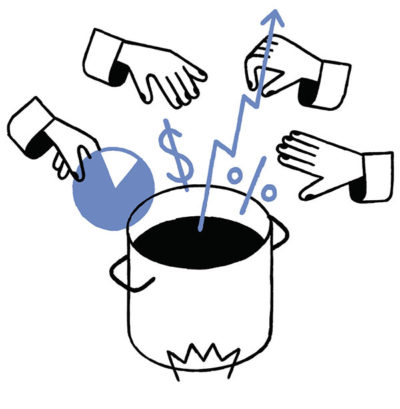
Illustration: Miguel Porlan
A group of 20 chefs from across the country arrived on campus last fall for a new five-day leadership program. Some were restaurateurs; others were bakers or artisanal coffee roasters or sold handcrafted ice cream.
They represented a range of culinary styles, but each had two traits in common: All were women, and all were inaugural fellows in the Women’s Entrepreneurial Leadership program, devised by Babson Executive and Enterprise Education for the James Beard Foundation (JBF), the New York-based national culinary nonprofit.
“Like most industries,” says Mitchell Davis, JBF’s executive vice president, “the food industry has a dearth of women leaders at a certain level.” The goal of the program is to support women who want to expand their businesses and hone their leadership skills. More than 90 applicants vied for 20 slots, which were offered as fellowships with all expenses covered by the foundation.
Davis explains that JBF had long sought to create a program that would help women in the field aim higher and imagine what’s possible. When, through a series of connections, Babson appeared on JBF’s radar, it seemed a perfect fit. Candida Brush, vice provost of global entrepreneurial leadership, and Victoria Sassine, adjunct lecturer, served as faculty directors for the program, which takes participants through such topics as managing staff, negotiations, finance, and value propositions. The week culminated with attendees making a final presentation detailing an action plan for growth.
More philosophically, Brush hoped the program would bring about a change in mindset for participants—transform them from puzzle solvers to quilt makers, as she puts it. Chefs, she notes, are task-oriented and tend to focus on the day-to-day. Instead, she says, “I wanted them to think about what it means to be more creative and more strategic.”
Carolyn Johnson, chef-owner of 80 Thoreau in Concord, Massachusetts, and Mooncusser Fish House in Boston, was excited to participate in the program. “I came away feeling very motivated and energized and exhausted,” she says, “with a greater understanding of my need to step away from my role as a cook and into my role as a business owner.”
The food industry is demanding for both men and women, but some of its challenges are unique to women. At a session on leadership and gender issues, several of the participants talked about feeling the need to walk the line between being liked and being respected. “That’s the double bind” for women managers, acknowledged session leader Susan Duffy, executive director of Babson’s Center for Women’s Entrepreneurial Leadership. “But here’s a hint,” she told the group. “You’re allowed to come back from a program like this and totally become the new boss.”
Brush says that though many of the week’s topics were not gender specific, “There is a benefit to having a single-sex cohort. They have common issues, and a cohort sisterhood is a little different from when you have a mixed group. It’s a safe space where you’re not being judged.” And, she adds, it facilitates forming a network of female peers.
Another participant, Elizabeth Wiley of Meadowlark Restaurant and Wheat Penny Oven and Bar in Dayton, Ohio, says the program was validating and empowering. But perhaps the most valuable takeaway was receiving the encouragement to think big. “The dream of doing what you want and succeeding at it,” she says. “That’s pretty heady stuff.”—Jane Dornbusch
